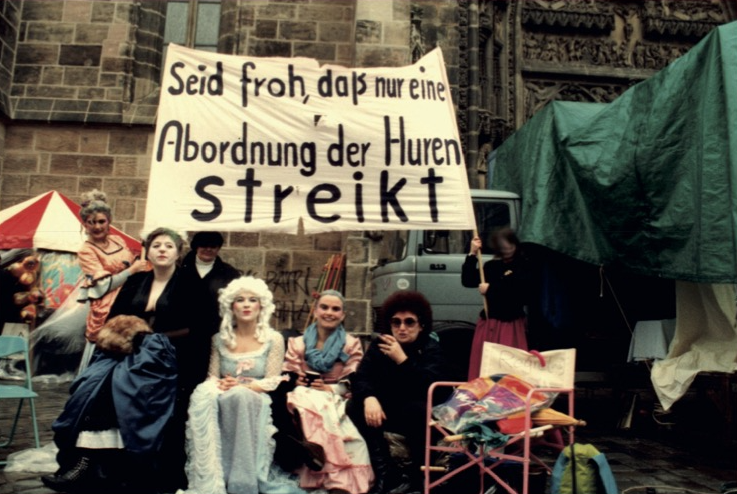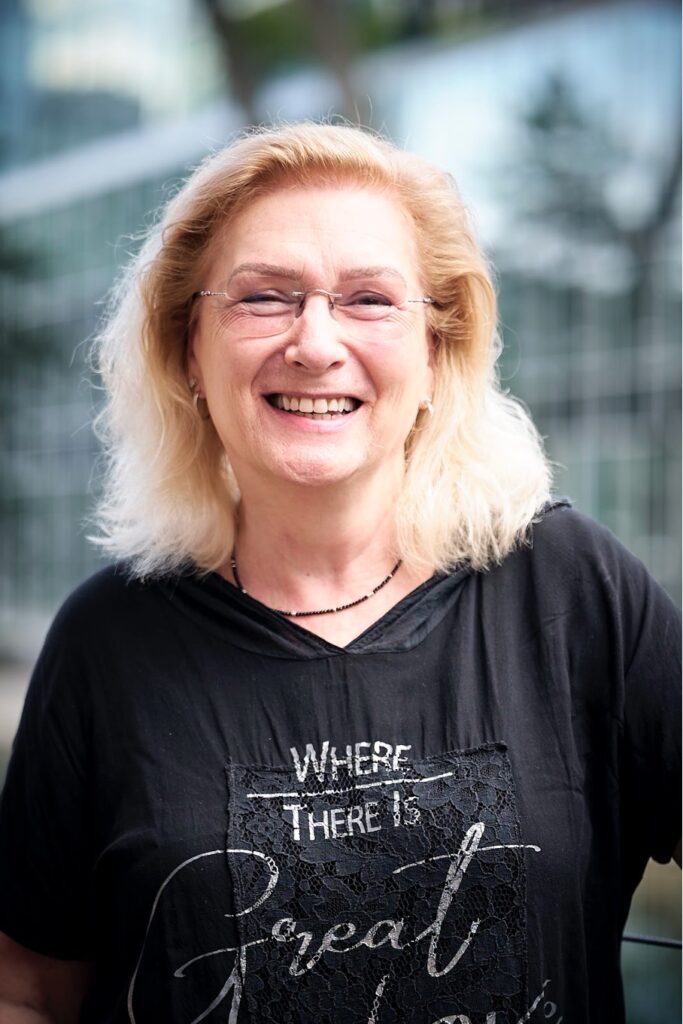

Doro is the chairperson of Kassandra e.V. – an association in Nuremberg, Germany, that campaigns for the abolition of all special laws and for the social and legal equality of sex workers. She has been active there for several decades and has achieved a lot with her work that one can be proud of. She is currently visiting Vienna to discuss the differences in German and Austrian legislation concerning sex work with the head of the department of “Sophie” among others. At our last event we had the pleasure to ask her about Pride.
#1 Why do we need an association like Kassandra?
According to Article 12 of the German Basic Law, people have the right to “freely choose their profession, place of work and place of training.” The association Kassandra e.V. emerged from self-help and was founded in 1987 by prostitutes, ex-prostitutes and feminists – in the heyday of the HIV/Aids hysteria – in which, among other things, sex workers were defamed as “disease slingers”.
Kassandra e.V. continues to advocate for the consistent decriminalisation and de-discrimination of sex workers, the abolition of all special laws, and legal and social equality with other workers. Because sex workers are still affected by stigmatisation, discrimination, violence and exclusion. Since 1988, the association has also been the sponsor of the specialist counselling centre of the same name.
“It is not the activity of sex work that is unworthy of human beings, but the conditions under which it must take place!”
The Prostitution Protection Act passed in 2017 is more of a control law with obligations such as compulsory counselling sessions, registration procedures and carrying a colloquially called “whore passport” as a valid registration certificate, without which no brothel operator or landlord will allow sex workers to work at their premises.
#2 The chronicle is entitled “Time to be proud”, how did it come about?
Sex work was not illegal in Germany, but prostitution had been considered equal to “professional criminality” and “immoral” since a court ruling in 1965, and apart from the discrimination involved, it had extensive negative effects on the living and working conditions of sex workers. The Prostitution Act 2002 clarified the legal status and improved the framework conditions. Our diverse experiences at Kassandra for 35 years have shown us how stigmatised sex work still is by existing laws, although we have achieved a lot since then:
Rape of a prostitute is no longer a minor offence. Prostitution is no longer immoral. Sex workers now also have rights and can take out health insurance as prostitutes and rent good jobs. Kassandra is a member of the DPWV (Deutscher Paritätischer Wohlfahrtsverband), part of various committees and working groups. We are well networked in the regional and supra-regional help system and work closely with other organisations.
The legal working group of the nationwide whore movement, in which we were organised, helped to draft its own bill for the legal and social equality of prostitutes with other gainfully employed persons as early as 1995. Now we are a member of the alliance of specialised counselling centres for sex workers.
#3 What is pride for you? Why is it important in your eyes?
With regard to Kassandra, I am proud of all those who have fought over this long period of time to transform Kassandra from a “dirty corner” to a recognised association and professional contact for offices, authorities and politicians. And that I was also able to contribute to this. I am very proud of our cultural projects such as “Art in the Brothel” and the play “Sex Work” at the Nuremberg State Theatre 2020, which I helped to support. I am also proud of our awards such as the Bavarian Prevention Prize 2005 for the so-called “Freier-Jingle”. In the radio play, the client demands sex without a condom and the prostitute cleverly argues why she doesn’t do it.
And I am proud of the Bavarian Health Promotion and Prevention Prize 2012 for “Mother-tongue audio texts for migrant illiterate women and anaphabets in prostitution”. And the Social Award of the State of Bavaria 2014. We are well networked in the regional and supra-regional help system and work closely with other organisations.
The legal working group of the nationwide whore movement, in which we were organised, helped to draft its own bill for the legal and social equality of prostitutes with other gainfully employed persons as early as 1995. Now we are a member of the alliance of specialised counselling centres for sex workers.
In relation to Kassandra, I am proud of the Women’s Advancement Award of the City of Nuremberg in 2016. And in 2019, the Luise Kieselbach Award for my personal voluntary work.
We at Kassandra are a successful and encouraging example of how social and political participation can make a difference in our society.
#4 How does your work empower people to be proud?
In general, sex workers are often exposed to massive prejudices and are often stigmatised and discriminated against because of their work or reduced to a victim status.
Since our association was founded, we have been fighting against these stereotypes and demanding:
“Don’t talk about sex workers, talk to them!”
This starts with the use of language: no longer “hookers” or “love servants” but prostitutes, sex workers or sex workers. The word work appears there and it’s about recognizing the activity as work! Part of my work with sex workers is not only a respectful and accepting attitude, but also seeing them as experts in their lives. To treat them with appreciation, to support them in self-acceptance, empowerment, and to develop resources together with competencies. Many people are rightly proud of their work and what they do for their families, for example.
When it comes to lobbying, I am clearly against a “ban on buying sex”, which would mean that there are no longer any safe jobs and that everyone who benefits from the income of sex workers, such as customers, tenants and so on, can be prosecuted.
More and more sex workers are speaking out themselves and have joined forces in associations: since 2013, sex workers have been in the Federal Association for Erotic and Sexual Services BesD and in the Professional Association for Sexual Services e.V. BSD. An association for clubs, bars, sex cinemas, whorehouses, SM studios and so on, as well as sex workers who campaign against discrimination and criminalization and for better living and working conditions.
#5 How can people support Kassandra and your work?
On a social level, all sex workers should generally be treated with respect. Regardless of whether their way of life and their lifestyle are contrary to their own morals or not. But that’s not enough, it’s also about taking a clear position against calls for a ban on the purchase of sex. A very important lever is of course the monetary resources that are made available to us for our work, i.e. monetary donations are an important basis for us. Here we rely on the support of every individual addict. In general, we are open and welcome very creative ideas on how we can build up our club, continue it and make it more visible and always have an open ear.
Kassandra e.V. – Advice center in Nuremberg https://www.kassandra-nbg.de
Advice center in Vienna http://www.sophie.or.at